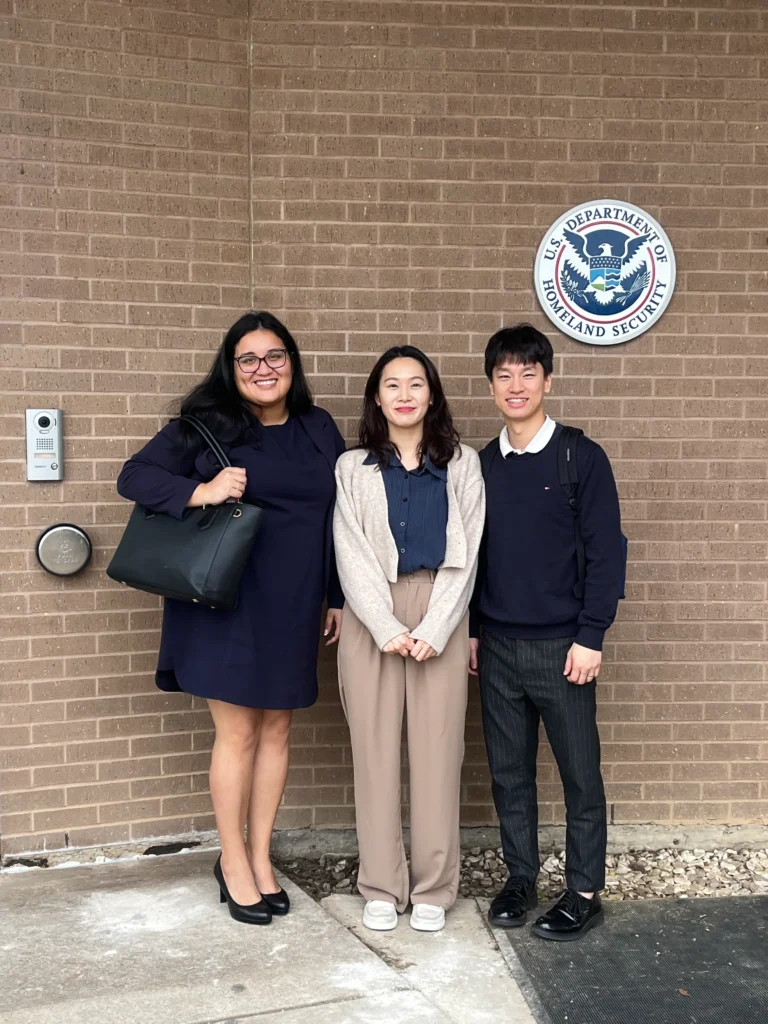- 817-330-9734
- Email: info@carrielegal.com
Federal litigation to end unreasonable delays and challenge unlawful detention
If your immigration case has been stuck for months or years with no response, or if you or a family member has been detained without proper legal basis, federal litigation may be your path forward. At the Law Office of Carrie Nguyen, we file Mandamus lawsuits and Habeas Corpus petitions to hold the government accountable and protect your rights.
Your life shouldn’t be on hold while the government fails to do its job. If you’re experiencing any of these situations, federal litigation may be necessary:

A federal lawsuit that compels USCIS or other government agencies to make a decision on your unreasonably delayed immigration case.
A constitutional remedy that challenges the legality of immigration detention and demands the government justify why someone is being held in custody.
Important Note:
Habeas Corpus petitions must typically be filed after exhausting other administrative remedies, though exceptions exist for constitutional violations or denial of basic procedures.

We review your case history, communications with USCIS, timeline, and documentation to determine if mandamus is appropriate.
We ensure you've made good-faith efforts through normal channels—service requests, USCIS inquiries, and other options.
We draft a comprehensive federal complaint and file it in the appropriate U.S. District Court, naming USCIS and the appropriate government defendants.
The lawsuit is formally served on USCIS and the U.S. Attorney's Office, requiring them to respond within 60 days.
In many cases, USCIS will adjudicate your case before responding to avoid court proceedings. If they respond, we present arguments to the court.
The court orders USCIS to act, or the agency makes a decision on your case. We continue representing you through final resolution.
We quickly evaluate the circumstances of detention, legal basis for custody, and constitutional violations.
We gather detention records, immigration court decisions, evidence of exhausted remedies, and proof of hardship.
We file the habeas petition in the appropriate federal district court, detailing why detention is unlawful.
If appropriate, we file for a temporary restraining order or preliminary injunction to secure immediate release.
The government must respond and justify the detention. We present arguments for release or bond hearing.
The court orders release, a bond hearing, or other relief if detention is found unlawful.
As immigrants ourselves, we understand what's at stake. Attorney Carrie Nguyen immigrated to the United States at age 10, and our all-female team is made up entirely of immigrants and children of immigrants. We don't just practice immigration law—we've lived it.
Federal litigation requires specialized knowledge of both immigration law and federal court procedures. We have the expertise to navigate complex federal litigation and hold government agencies accountable. Carrie is admitted to practice is Northern / Western / Eastern / Southern Districts of Texas
With 290+ five-star Google reviews, our clients trust us because we deliver results and keep our promises.
We provide regular updates throughout the litigation process. You'll never be left wondering what's happening with your case.
We set clear expectations and timelines. If we take your case, it's because we believe we can help you move forward.
Federal litigation can be stressful and uncertain. We guide you with compassion and clarity, ensuring you understand every step of the process.


Federal litigation involves attorney fees and court filing costs. During your consultation, we’ll provide transparent pricing and discuss payment options.
While we cannot guarantee specific results, federal litigation is often successful in:
Most cases see USCIS action within 60-180 days after filing. Many times, USCIS adjudicates the case before responding to the court to avoid judicial oversight.
No. Federal law prohibits retaliation against applicants for exercising legal rights. Filing mandamus is a legitimate legal remedy.
Costs vary based on case complexity. We provide transparent pricing during consultations and discuss payment options.
Generally, delays of 6+ months beyond normal processing times may qualify. We evaluate each case individually.
It depends. Habeas corpus challenges detention, not removal orders. However, you may file habeas to challenge unlawful detention while removal proceedings are pending.
Habeas corpus petitions are filed where the person is detained. We can coordinate with local counsel or refer you to qualified attorneys in other jurisdictions.
No. The longer the delay, the stronger your case. But we evaluate based on unreasonableness, not just posted processing times.
USCIS must make a decision—approval, denial, or request for evidence. We continue representing you through the final outcome.
You don’t have to wait in limbo forever.
If your immigration case has been unreasonably delayed, or if you or a loved one is being held in detention without proper legal basis, federal litigation may be the answer. The Law Office of Carrie Nguyen has the experience and determination to hold the government accountable and protect your rights.
We guide. We protect. We empower.
During your consultation, we will:
At the Law Office of Carrie Nguyen, we stand beside immigrant families when the system fails to act. With persistence, expertise, and compassion, we fight to move your case forward and protect your constitutional rights.
Serving families nationwide with federal immigration litigation.
Carrie is admitted to practice is Northern / Western / Eastern / Southern Districts of Texas
Ready to get started?